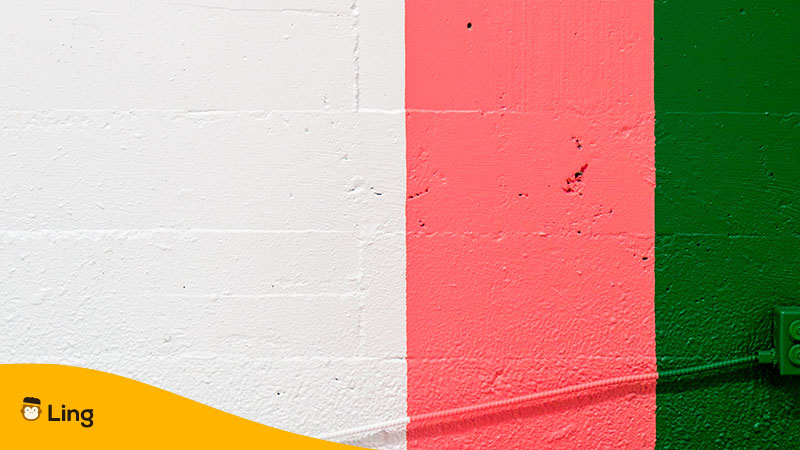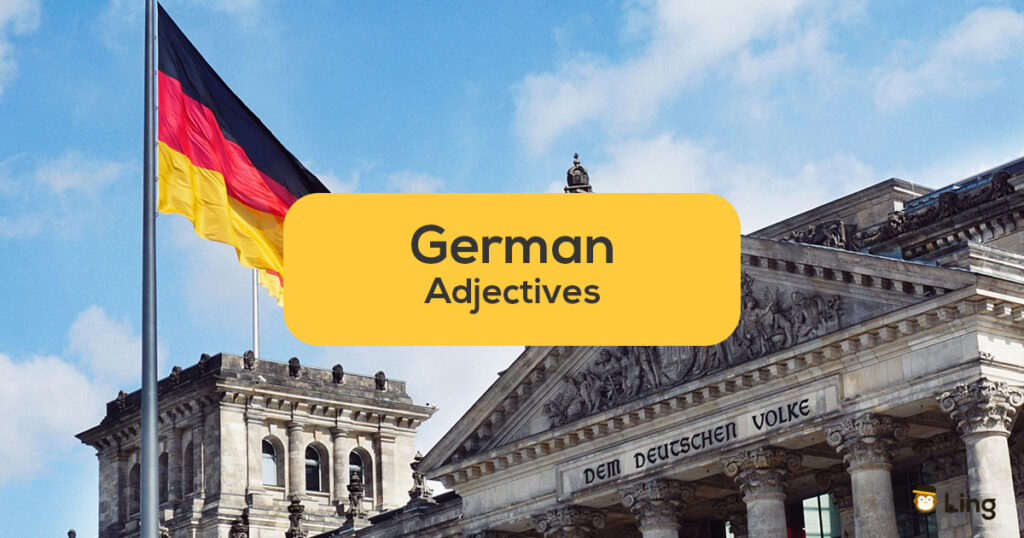Learning German is never easy, especially for total beginners. If you have been studying this epic language for some time, you will surely want to learn more about critical grammar points to start speaking it more fluently. When it comes to expressing yourself, it is not enough to master verbs, you NEED adjectives or adjektive too! In this article, we will introduce you to the basic concepts you need to know to understand German adjectives and move to the next level. Are you interested? Let’s get started!
What Is An Adjective?
The Oxford dictionary defines an adjective as “a word that describes a person or thing.” Adjectives allow us to describe or attribute specific qualities to people, animals, or objects. They play an essential role in communication.
Imagine we are in a group of people, and I say to you: “look at that person” you would surely ask me which person, right? If I tell you “the man,” and there are many men, you will ask me, “which man?” If I cannot point at him, it would be impossible to specify who he is.

Now, let’s use adjectives and see how the situation changes.
Example
“Look at that person! The tall man with black hair. He is wearing a red shirt with long sleeves.”
This example shows how adjectives give clarity and enrich communication. Identifying “the man” within the group is much easier if we use adjectives to describe him.
How Do German Adjectives Work?
German adjectives have some similarities with English adjectives. They serve to describe colors, sounds, shapes, sizes, emotions, tastes, etc. It is important to note that when we are using German adjectives, placement matters. This means that if we place the adjective before or after the noun, the ending of that adjective might change.
In the following table, we’ll see some examples:
| German | English |
| Grün | Green |
| Blau | Blue |
| Gelb | Yellow |
| Früh | Early |
| Schnell- | Fast |
| langsam | Slow |
| Traurig | Sad |
| Klein | Little |
| Süß | Sweet |
| Laut | Loud |
| Rund | Round |
In the examples below, the adjectives come after the nouns, so they stay in their original form.
- Der Baum ist grün– The tree is green.
- Der Mond ist silbern-The moon is silver.
- Das Auto ist klein-The car is small
Now we’ll see some examples where the adjective comes before the noun.
- Der grüne Baum → The green tree.
- Der silberne Mond → The silver moon.
- Das kleine Auto → The small car.

Comparative And Superlative Adjectives
Comparing is something we do in most languages, if not all. We compare things, people, actions, and qualities, among other things. If we want to establish superiority, we use superlatives. If you make a comparison using German adjectives, we have to add -er to the end of the adjective. If we’re going to form the superlative, we add -sten or -esten instead of -er.
Examples:
- Lisa ist dünn. → Lisa is thin.
- Laura ist dünner. → Laura is thinner.
- Mia ist am dünnsten. →Mia is thinnest
If you want to compare Lisa and Mia, you could say:
Lisa ist dünner als Mia → Lisa is thinner than Mia
*als=than
As in all languages, there are exceptions. For example, there are “irregular adjectives,” and using the formula does not work with those. Depending on which adjective is, you may need to modify a word or letter.
Let’s look at some examples.
- Gut | besser | am besten → Good | better | best
- Gern | lieber | am liebsten → Like | prefer | dearest-like best
- Viel | mehr | am meisten → Much | more | most
- Groß | größer | am größten → Tall | taller | tallest
- Kurz | kürzer | am kürzesten → Short | shorter | shortest
On the other hand, if you want to establish similarity or express that there is a shared quality between two nouns, you use an adjective in its original form and put it between so (as) and wie (as/like).
- Lisa ist so dünn wie Mia. → Lisa is as skinny as Mia.
- Pizza ist so gut wie Pasta → Pizza is as good as pasta.
- Tee ist nicht so gut wie Kaffee → Tea is not as good as coffee.
Possessive German Adjectives
Possessive adjectives play a huge role in crafting grammatically correct sentences as they modify a noun by helping identify who owns them. In German, there are eight possessive adjectives:

- Mein — My/mine
- Dein — Your/yours (singular, informal)
- Ihr– Your (formal)
- Sein — His
- Ihr — Her/hers
- Unser — Our/ours
- Euer — Your/yours (plural, informal)
- Ihr — Their/theirs
Examples
- Mein Laptop ist kaputt. → My Laptop is broken.
- Unser Haus ist klein. → Our house is small.
- Dein Name ist schön . → Your name is beautiful.
It is essential to mention that possessive adjectives are affected by German cases (nominative, accusative, genitive, dative) and gender. Therefore, it is crucial to study how they change to get a grasp of it.
Adjective Declension Or Adjective Ending
Adjective declension (deklination von adjektiven) refers to the change in the endings of an adjective. This is done so that the adjective will agree with a specific noun in terms of gender, number and case. As we discovered earlier, the adjective ending changes if we place adjectives before German nouns. This is just one of the many examples of declension. The article that comes before the adjective determines the type of declension, and there are three types:
- Weak declension or weak endings (the definite article + adjective) = The new car – Das neue Auto
- Mixed declension or mixed endings (indefinite article + adjective) = A neu car – Ein neues Auto
- Strong declension or strong endings (no article + adjective) = New car- Neues Auto
As this topic is quite extensive, we cannot cover it in depth in this article. However, if you are unfamiliar with the German adjective declension, I recommend researching it more in detail to ensure you can use it confidently.
List Of Useful German Adjectives And Their Opposites
Now that we have covered the basics of German adjectives let’s learn even more. The following table lists the most common adjectives and their opposites.
| German | English | Opposite | English |
| Alt | Old | Jung, neu, modern | Young, new, modern |
| Bekannt | Known, famous | Unbekannt | Unknown |
| Besser | Better | Schlechter | Worse |
| Bestimmt | Specific, definite, certain | Unbestimmt | Indefinite |
| Dankbar | Grateful | Undankbar | Ungrateful |
| Dick | Thick, fat | Dünn | Thin |
| Ehrlich | Honest | Unehrlich | Dishonest |
| Elegant | Elegant | Unelegant | Inelegant |
| Erfahren | Experienced | Unerfahren | Inexperienced |
| Freundlich | Friendly | Unfreundlich | Unfriendly |
| Froh | Glad | Traurig | Sad |
| Geduldig | Patient | Ungeduldig | Impatient |
| Geizig | Stingy | Großzügig | Generous |
| Gemütlich | Comfortable, cozy | ungemütlich | uncomfortable |
| Gesund | Healthy | Ungesund, krank | Unhealthy, sick |
| Glatt | Smooth | Rau | Rough |
| Glücklich | Happy | Unglücklich | Unhappy |
| Groß | Large, big | Klein | Small, tiny |
| Gut | Good | Schlecht, böse | Bad, evil |
| Hart | Hard | Weich | Soft |
| Heiß | Hot | Kalt | Cold |
| Hell | Bright | Dunkel | Dark |
| Hoch | High, tall | Tief | Deep |
| Höflich | Polite | Unhöflich | Impolite |
| Hungrig | Hungry | Satt | Full, fed up |
| Interessant | Interesting | Uninteressant, langweilig | Uninteresting, boring |
| Klar | Clear | Unklar | Unclear, obscure |
| Lang, lange | Long | Kurz | Short |
| Laut | Loud | Leise | Quiet |
| Lustig | Funny, amusing | Unlustig, ernst | Not amusing, unfunny, serious |
| Nass | Wet | Trocken | Dry |
| Normal | Normal | Unnormal | Abnormal |
| Offen | Open, open-minded | Geschlossen, verschlossen | Closed, locked, closed off, |
| Öffentlich | Public | Privat | Private |
| Ordentlich | Neat, tidy | Unordentlich | Messy, unkempt |
| Positiv | Positive | Negativ | Negative |
| Pünktlich | Punctual, on time | Unpünktlich | Unpunctual, tardy |
| Reich | Rich | Arm | Poor |
| Richtig | Right, correct | Falsch | False, not correct |
| Sauber | Clean | Dreckig, schmutzig | Dirty |
| Schnell | Fast | Langsam | Slow |
| Schön | Beautiful | Hässlich | Ugly |
| Schwer, schwierig | Hard, difficult | Leicht, einfach | Easy, simple |
| Spät | Late | Früh | Early |
| Stark | Strong | Schwach | Weak |
| süß | Sweet | Sauer | Sour, angry |
| Sympathisch | Sympathetic | Unsympathisch | Unsympathetic |
| Teuer | Expensive | Billig | Cheap, inexpensive |
| Viel | Many, a lot | Wenig, gering | Little, low |
| Wichtig | Important | Unwichtig | Unimportant |
| Zufrieden | Satisfied, content | Unzufrieden | Dissatisfied, unhappy |
Ready To Reach The Next Level In German?

Learning German can be fun, especially if you combine your study plan with engaging activities that will strengthen your knowledge of the German language. With the Ling App you can access multiple exercises that will help you improve your language skills. And the best thing is that you can download it for free. Go to the App Store or Play Store and start to speak German today! Tschüss!



































































